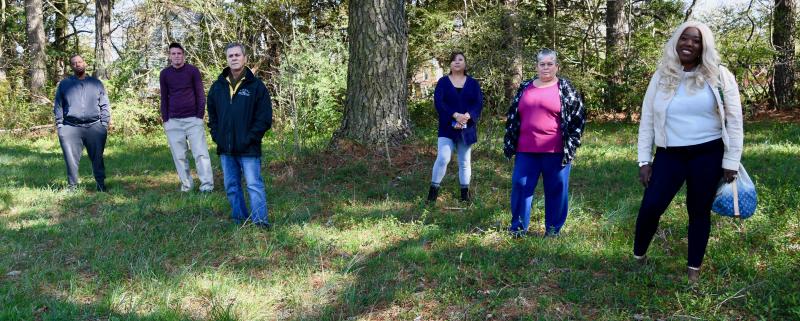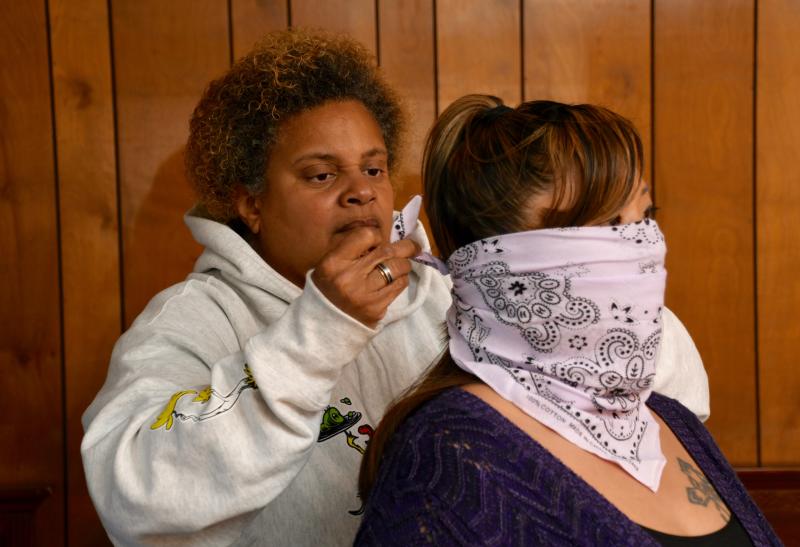Amid the COVID-19 pandemic, homeless people in the area are facing more challenges than before. Many have nowhere to go now that winter shelters have closed their doors.
In addition, many businesses who hire as the beach season approaches are shut down or not hiring.
Immanuel Shelter, based in Rehoboth Beach, has offered free stays in 15 local motel rooms, and was scheduled to shut down April 1. Thanks to emergency state funding, the shelter has been granted a temporary reprieve, and the program continues, said interim President Don Peterson.
However, he said, only those currently being housed can remain, and no new clients can be accepted. “We are basically sheltering in place, trying to keep everyone safe,” he said.
Code Purple emergency shelters, including one at the former Delaware State Police Troop 7 building near Lewes, shut down in mid-March.
Homeless people who have been part of the program the last few months are now asking, “What's next?”
“I don't know what is going to happen,” said Dennis, a homeless man who has been housed at the Code Purple shelter. “There is no plan in place. and most of us have nowhere to go when the shelter shuts down. Soon 40 to 50 people here are going to be exposed to the environment 24/7.”
“We are humans. We are not bad people,” said Pamela, who is also homeless. “For many of us, we were just one paycheck away from being homeless. We've been able to find normalcy here. Hopefully, we'll get a little extension. We are trying to stay positive. Homelessness is not a bad word.”
“I feel for them when they leave here. God only knows what will happen on the streets. I'm here to help as much as possible,” said program coordinator Toni Short. “For many, it takes more than a few months to get back on their feet.”
Had to turn people away
Peterson said rooms have been filled every night.
“We've had to turn people away and refer them to other shelters if they are open,” Peterson said. “There is much more demand than supply.”
Peterson said the program was new, and no one was sure what to expect. “The folks have formed a community and are mutually supportive,” he said. Guests are doing room checks, taking care of trash, helping to serve meals and helping to find each other jobs.
Peterson said some changes have been made to safeguard the health of volunteers, staff and guests due to COVID-19. Volunteers have still been providing a hot meal each night, but volunteers are now dropping off food and not helping serve.
“With two people to a room, except families, we are not crowding people as we did when we had a Code Purple shelter,” Peterson said. “We are keeping an eye on everyone so we don't contribute to spreading the infection.”
Some report to jobs each day, but most are confined to their rooms or the immediate area.
Short, who is a nurse, said she screens everyone. If they show symptoms, they are not permitted to take part in the program, and she refers them to walk-in clinics or the emergency room. “Issues can arise because a lot of homeless people don't have medical insurance,” she said.
Short said she educates and provides updates on the virus to guests. “We practice good hygiene at all times. I tell them that this is serious. They have no problem being quarantined,” she said.
She said two people were sick with coughs and they were sent to the hospital. “It was a scare, but it turned out to be bronchitis,” she said.
Except for people who work, Short said, she stresses the importance of minimizing exposure to the public.
Need for housing
Short said many homeless people are on waiting lists for vouchers for subsidized housing, but the waiting time can be more than a year. “So they live in their cars and in tents and are hassled by police,” she said.
Short said living in tent cities exposes people to close quarters and transient people. “How can we take care of them if they get symptoms? Most won't go to the hospital,” Short said.
She said all agencies and organizations that assist the homeless need to join forces to fight for affordable housing. She said the coastal area has the highest apartment rents in the region. “With rents of $1,400 and up, they are catering to the retired wealthy and pushing homeless people away,” she said.
“We need to help people who are trying. We need to all connect together and find a better solution.”
“Most of the people who are here are from this area and want to live here,” Dennis said. “But we are part of an invisible community.”
Survival during the pandemic
For homeless people who aren't in shelters, it's nearly impossible to follow any of the Centers for Disease Control and Prevention guidelines to protect yourself and others from COVID-19, said Jim Martin, homeless advocate and director of Shepherd's Office in Georgetown.
Martin said the homeless are focused on survival and finding their next meal, not on social distancing.
Martin estimates there are as many as 1,000 what he calls roofless homeless people who live in tents or cars. He said there are another 5,000 to 6,000 people who don't have homes and live with relatives, or double or triple up with others in rental houses.
He said he fears that those in the larger group are in jeopardy of becoming roofless. “Those situations could change with one bad conversation as people freak out about the virus,” Martin said.
He said with closings of many businesses and social programs, normal routines of homeless people have been interrupted. “They feel more disconnected as they try to find places to eat and use the bathroom,” he said.
Life and death goes on
Amid the pandemic, Martin said, life and death go on. He said a friend and regular participant in Bible study programs and volunteer at Shepherd's Office recently died of a heroin overdose. The 40-year-old father of an 8-year-old fell into depression and started using the drug again, Martin said.
The 40-year-old, who worked at Perdue, lived in a tent near the railroad tracks near Georgetown.
“He was always very kind and helpful to us. He was also caring and kind to others in our homeless community,” Martin said.
A place for the homeless
Martin is reaching out to officials to set aside property for area homeless to pitch their tents. “I fear that homeless will be super spreaders of the virus because they have nowhere to self-quarantine,” he said.
He said if most of the homeless could be confined to one area, health officials could monitor their health.
“When those living in their cars and tents in the woods show symptoms, they will go to the hospital because they have nowhere else to go, putting people at risk,” he said.
Martin also said the stress of the current situation is even harder on the homeless who are vulnerable because their immune systems are compromised due to lack of sleep and proper nutrition.
Editor's note: Last names of people who are homeless have not been used at the request of Immanuel Shelter.






















































